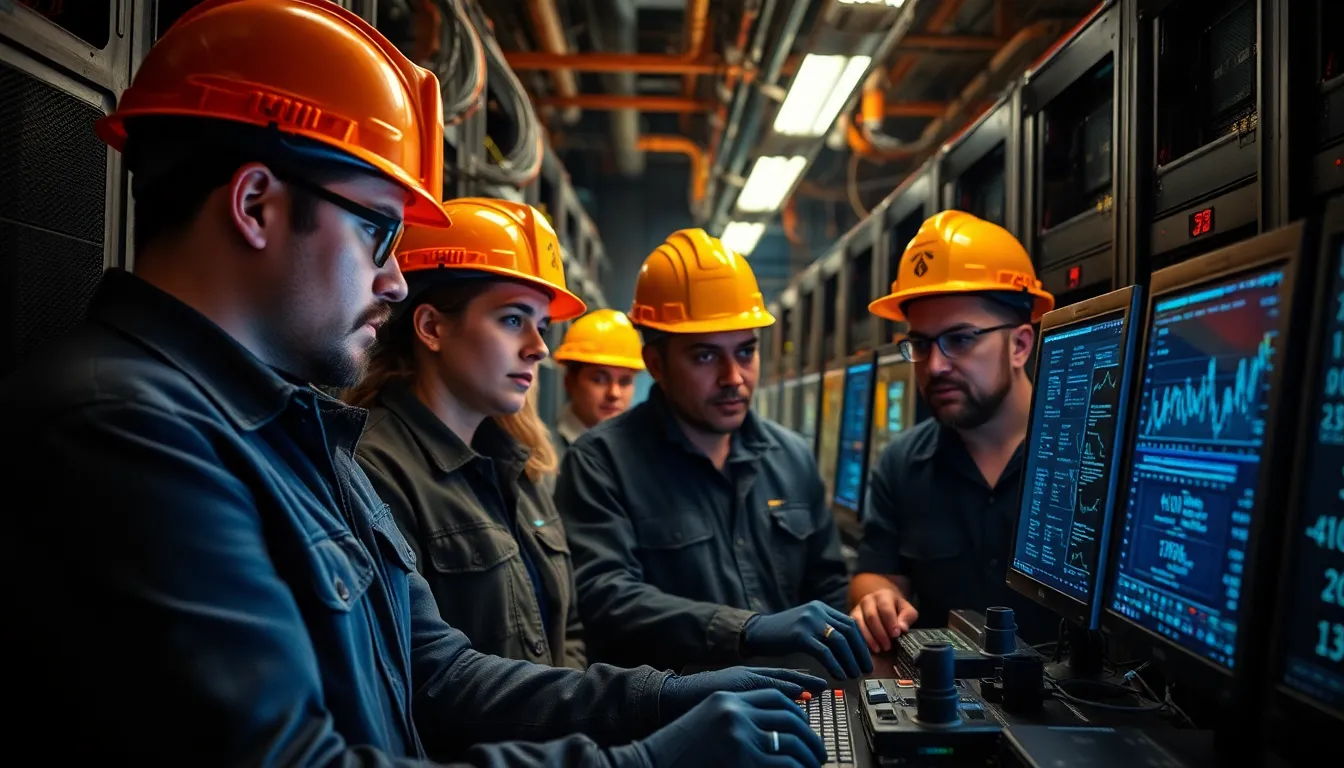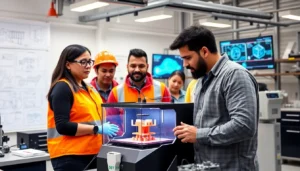Table of Contents
ToggleIn a world where digital currencies are taking the spotlight, bitcoin mining stands out like a shiny gold nugget in a vast digital landscape. But what exactly is this mysterious process? It’s not about panning for gold in a river; instead, it’s about solving complex puzzles that keep the bitcoin network running smoothly. Think of miners as the unsung heroes of the crypto realm, armed with powerful computers and a knack for problem-solving.
Overview of Bitcoin Mining
Bitcoin mining is essential for the operation of the bitcoin network. This process ensures transactions are verified and new bitcoins are generated.
What Is Bitcoin Mining?
Bitcoin mining involves the use of powerful computers to solve complex mathematical puzzles. These puzzles secure the network by verifying transactions. Successful miners receive rewards in the form of newly minted bitcoins. The process also maintains the decentralized nature of bitcoin. Miners play a critical role by preventing fraud and double-spending.
How Bitcoin Mining Works
Mining operates through a proof-of-work mechanism. Miners compete to solve a cryptographic problem first, adding a new block to the blockchain. Each block contains transaction data, timestamps, and a unique identifier. When a miner solves the puzzle, they share the solution with the network. Other miners verify the answer before a new block gets added to the blockchain. This collaboration enhances security while ensuring that the entire process is transparent and tamper-resistant.
The Importance of Bitcoin Mining

Bitcoin mining plays a vital role in the cryptocurrency landscape, ensuring the network’s integrity and functioning. Through this process, miners contribute significantly to both security and validation of transactions.
Security and Transaction Validation
Security relies on miners continually verifying transactions. Each transaction is grouped into a block and then added to the blockchain following validation. Miners utilize rigorous cryptographic techniques to solve complex puzzles and secure the network. This verification process prevents double-spending, ensuring only valid transactions are processed. When a miner successfully solves a puzzle, the block containing verified transactions gains acceptance across the network. Security enhances trust, making bitcoin transactions reliable.
Role in the Bitcoin Ecosystem
Miners serve as the backbone of the bitcoin ecosystem. By validating transactions, they maintain the network’s decentralized nature. Miners compete to add blocks, which generates new bitcoins and incentivizes their efforts. This competition fosters a healthy ecosystem filled with active participants. Blocks added increase the blockchain’s length and complexity, creating a secure history of transactions. Furthermore, as mining rewards decrease over time, the system encourages miners to innovate and increase efficiency. The overall functionality of the bitcoin network heavily depends on this mining process.
Types of Bitcoin Mining
Bitcoin mining encompasses several methods, each with distinct characteristics that cater to different preferences and resources. Understanding these methods helps miners choose the best approach for their needs.
Solo Mining
Solo mining involves an individual miner working independently to solve cryptographic puzzles. Miners in this method require significant computing power to compete with others in the network. If a miner successfully adds a block to the blockchain, they receive the entire block reward. However, the chances of success decrease as more miners join the network. Solo miners must also cover all operational costs, including electricity and hardware, which makes it a high-risk endeavor.
Pool Mining
Pool mining allows multiple miners to combine their computing power to increase their chances of solving blocks. Participants share the overall computational effort, leading to faster solutions. When a block is solved, the reward is distributed among the pool members based on their contributed power. This method reduces the individual variance of rewards and makes income more stable. Pool mining suits beginners and those without substantial resources, as it lowers costs and risks while still providing opportunities for earning bitcoin.
Cloud Mining
Cloud mining offers a way to mine bitcoins without owning hardware. Through cloud services, individuals rent mining power from datacenters. This model eliminates the need for expensive equipment and the associated maintenance costs. Cloud mining contracts often specify a duration and payment structure, which allows miners to predict potential returns. Caution is necessary, as some cloud mining services can be untrustworthy. Ensuring that services are reputable enhances the likelihood of earning returns on investments while minimizing risks.
Challenges of Bitcoin Mining
Bitcoin mining presents several challenges that miners must navigate to maintain efficiency and sustainability.
Environmental Impact
The energy consumption of bitcoin mining raises significant environmental concerns. Estimates suggest that bitcoin mining consumes approximately 100 terawatt-hours annually, equating to the energy use of some countries. Miners often rely on fossil fuels for electricity, contributing to increased carbon emissions and climate change. Sustainable mining operations are emerging, harnessing renewable energy sources like solar and wind to mitigate this impact. Initiatives aimed at improving energy efficiency in mining equipment also play a role in addressing these environmental challenges.
Technical Barriers
Technical barriers pose obstacles for miners trying to optimize their operations. High competition in the mining space can create challenges in acquiring the latest hardware, which often means significant upfront investments. Additionally, the complexity of mining algorithms continues to evolve, requiring miners to stay updated on advancements and adapt their strategies accordingly. Mining pools can help mitigate some technical challenges by pooling resources and sharing computing power. However, miners still face issues related to network latency and potential rewards dilution when participating in these collaborative efforts.
Future of Bitcoin Mining
The future of bitcoin mining presents both exciting opportunities and significant challenges. Innovations in technology and evolving regulations shape its trajectory.
Technological Innovations
Emerging technologies continuously transform the bitcoin mining landscape. Next-generation ASIC miners improve efficiency, significantly reducing energy consumption. Integration of artificial intelligence enhances mining strategies, optimizing resource allocation. Furthermore, advancements in cooling systems increase operational sustainability, prolonging hardware lifespan. Miners increasingly adopt renewable energy sources, decreasing reliance on fossil fuels. Lastly, innovations like layer two solutions and sharing economies enhance transaction processing speeds while reducing costs.
Regulatory Considerations
Regulatory landscapes play a crucial role in the future of bitcoin mining. National governments and agencies worldwide are increasingly focusing on cryptocurrency practices. Compliance requirements aim to address energy consumption and environmental impact concerns associated with mining. Some jurisdictions encourage sustainable practices through incentives. Others may impose stricter regulations that affect mining operations, especially those reliant on non-renewable energy sources. Understanding legal frameworks helps miners navigate risks while optimizing their strategies for changing regulations.
Bitcoin mining stands at the intersection of technology and finance driving the cryptocurrency ecosystem forward. As miners tackle complex puzzles and verify transactions they play an essential role in maintaining the integrity and security of the network. The challenges posed by energy consumption and competition highlight the need for innovation and sustainability in the mining process.
With advancements in technology and a growing emphasis on renewable energy solutions the future of bitcoin mining looks promising. Miners who adapt to evolving regulations and embrace sustainable practices will not only enhance their operations but also contribute to a more responsible cryptocurrency landscape. As the industry continues to evolve staying informed and proactive will be key for miners navigating the exciting yet challenging terrain ahead.







